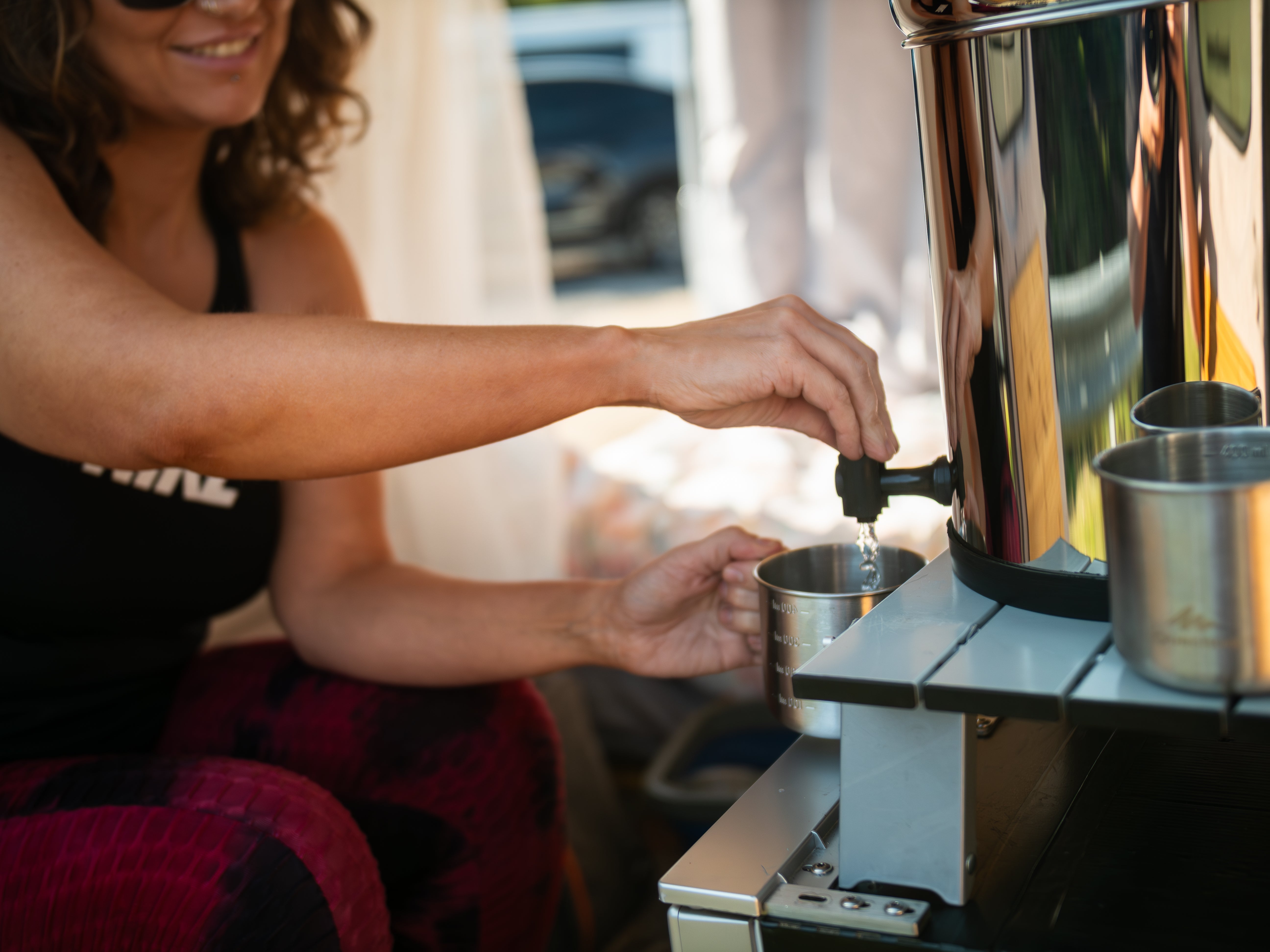Water. We know we need it. But do we know how much?
When it comes to your daily beverage choices, it can seem that there's almost too much choice available. With a wide array of options including coffee, tea, cordials, sugary drinks, or diet carbonated beverages – we often don’t feel dehydrated, even when our bodies are crying out for more water in its simplest form.
When you consider the drinks you consume, they can often be laden with detrimental ingredients, or stimulants, that can have an impact on your overall health. Even sugar-free options, which are lower in calories, can contain artificial sweeteners such as aspartame which can have negative effects in the long term - as demonstrated by comprehensive evaluations by reputable organisations such as the International Agency for Research on Cancer (IARC), the World Health Organization (WHO) and the Food and Agriculture Organization (FAO) Joint Expert Committee on Food Additives (JECFA).
This is why you should be mindful of how many of these beverages you do consume in a day, and instead focus on your daily water intake.
Why is Water Important?
Water is essential for life and is involved in all functions of the human body1.
As the largest single constituent of the human body, making up approximately 60% of the adult and 75% of children's bodies, respectively3 we need to pay attention to what we drink throughout the day to ensure that we are meeting our daily water needs as not doing so may have negative health effects4.
Water also:
· Regulates body temperature
· Helps to transport nutrients
· Assists digestion and waste excretion
· Acts as a ‘shock absorber’ for vital organs
· Helps maintain blood pressure
This means that, beyond hydration, water is absolutely essential to all of your bodily functions.

How Much Should You Drink a Day?
Public confusion about how much plain water to drink continues to the present day10.
Several organisations, such as World Health Organisation (WHO) and the National Health Service (NHS) have conducted extensive research on how much water you should drink a day. The recommendations can also vary depending on a range of factors, including age, weight, activity levels and climate! This is alongside a whole range of other variables per person.
For years, a 1945 US Food and Nutrition Board report was used as a rule of thumb for human water consumption. Known as the “8 × 8” rule, it stated that an adult should drink eight 8-oz glasses of water a day (64 oz). Despite more recent studies showing that it is insufficient, the recommendation of drinking eight 8-oz glasses of water a day continues to be referred to today8.
You may be trying to achieve this figure and struggling - and the reason is quite simple.
And the reason is that each individual is different and your water intake is directly associated with the aforementioned range of factors (such as age, weight, lifestyle and climate).
Take, for instance, the minimum daily water intake necessary for fluid replenishment in a human weighing 70 kg residing in a cooler region, this corresponds to 3 litres per day or 42.9 millilitres per kilogram.
Conversely, the minimal water needs for a person of the same weight residing in a warmer area ranges from 4.1 to 6 litres per day, or 58.6 to 85.7 millilitres per kilogram6.
Therefore, human water requirements should be based on personal requirements, as trying to adhere to stricter guidelines may eventually lead to a deficit and possible adverse performance and health consequences7.
Some water can also be taken into the body through foods you eat. With a healthy and well-balanced diet, about 20% of water consumption is from food. To determine your daily water intake, a healthy adult requires around 35 ml of water each day per kilogram of body weight.
Foods That Help Hydration
If you struggle to drink you water intake, you could boost your hydration by eating your water too! Several well-known foods that are naturally high in water content and can contribute to your overall hydration.
These include:
· Watermelon
· Cucumber
· Lettuce
· Oranges
· Broths and soups (but be aware of sodium levels for these)
How Much Water Should You Drink Per Hour?
Water, or its lack of (dehydration), can influence cognition2. Studies have shown that mild levels of dehydration can produce disruptions in mood and cognitive functioning11.
Underhydration has also been linked to an increased risk of major health issues such as chronic kidney disease, cardiovascular disease and obesity. So, when it comes to staying properly hydrated, the question of how much water to drink per hour frequently arises.
Maintaining fluid balance is essential for the human body, and it is important to drink water when needed. Therefore, it doesn’t mean that you need to drink a certain amount per hour – but you do need to be aware of staying hydrated frequently throughout the day.
However, there are limits to the maximum amount of water you should drink in a single hour. An evaluation carried out by the US Army concluded that your liquid intake should not surpass 1.03 litres within an hour or exceed 11.35 litres over the course of a 24 hour day14
Navigating Hydration Needs in Different Weather Conditions
There is often uncertainty around how much water you should drink in hot weather. Naturally, the general rule of thumb is to ensure that you compensate for any water excreted through sweat. This also applies to exercise, when your body temperature rises and you sweat more!
As your body undergoes thermal stress due to the heat, it is essential to carefully manage your water levels. By understanding the importance of sufficient water intake, you can ensure that your body stays well-hydrated while combating the impacts of high temperatures15.
The Effects of Drinking the Recommended 2 Litres of Water Daily
This often depends on how you drink this water. If you realise that you have yet to meet your goal intake and drink a large quantity within a short time, this will likely mean the water you drink will not reach the extracellular space, where it is needed, and as such has no real effect on hydration; all it does is dilute the urine12.
Speaking of urine, this is a very good indicator of your hydration levels and whether you do need to increase, or decrease, your hydration levels. Generally, the darker your urine, the more dehydrated you are; the lighter it is, the more hydrated your body is. Pay attention to the smell, too, as changes in odour can also signal shifts in hydration levels.

Tips to Drink More Water Each Day:
Have a visual reminder – Adding a visual reminder to stay hydrated is a great step to making sure that you hit your daily water goals. Try placing a water filter system such as the British Berkefeld Gravity Can in your kitchen, dining room, office, or even garden in the summer, to ensure that you and your family drink enough water.
Take it on the go – A reusable water bottle can be popped into your bag and taken anywhere you go. If you choose a reusable bottle with a water filter inside, you also don’t have to worry about the taste or quality of water when out and about. Note that this type of filter (as with all Doulton and British Berkefeld systems) is only suitable for drinking water from taps, not natural water sources such as rivers or lakes.
Improve the taste - Some people like to add cordials or fruit to their water to improve the taste. This is great to encourage children to keep drinking their water throughout the day, especially if you include them in the water infusion process! However, be cautious when it comes to cordials due to sugar and/or sweetener content.
Eat your water – As mentioned, there are a range of foods that have a high water content and can contribute to your daily hydration. Include this as part of a balanced diet and avoiding dehydration, especially in the summer months, will feel effortless.

References
1. Liska, D., Mah, E., Brisbois, T., Barrios, P. L., Baker, L. B., & Spriet, L. L. (2019). Narrative review of hydration and selected health outcomes in the general population. Nutrients, 11(1), 70.
3. Liska, D., Mah, E., Brisbois, T., Barrios, P. L., Baker, L. B., & Spriet, L. L. (2019). Narrative review of hydration and selected health outcomes in the general population. Nutrients, 11(1), 70.
4. Jéquier, E., & Constant, F. (2010). Water as an essential nutrient: the physiological basis of hydration. European journal of clinical nutrition, 64(2), 115-123.
5. Stookey, J. D., & Kavouras, S. A. (2020). Water researchers do not have a strategic plan for gathering evidence to inform water intake recommendations to prevent chronic disease. Nutrients, 12(11), 3359.
6. Burlingame, G. (2006). How Much Water Should We Drink? Opflow, 32(2), 8-9.
7. Dai, B., Chen, R. C., & Ding, Y. Y. (2019). A practical approach for estimating human daily water intake. International Journal of Embedded Systems, 11(2), 210-219.
8. Sawka, M. N., Cheuvront, S. N., & Carter, R. (2005). Human water needs. Nutrition reviews, 63(suppl_1), S30-S39.
9. Dai, B., Chen, R. C., & Ding, Y. Y. (2019). A practical approach for estimating human daily water intake. International Journal of Embedded Systems, 11(2), 210-219.
10. Tarulli, K., Bales, D., & Wallinga, C. (2014). How much water should you drink?
11. Popkin, B. M., D'Anci, K. E., & Rosenberg, I. H. (2010). Water, hydration, and health. Nutrition reviews, 68(8), 439-458.
12. Rodger, A., & Papies, E. K. (2022). “I don't just drink water for the sake of it”: Understanding the influence of value, reward, self-identity, and early life on water drinking behaviour. Food Quality and Preference, 99, 104576.
13. Tsindos, S. (2012). What drove us to drink 2 litres of water a day?
14. World Health Organization. (2005). Nutrients in drinking water (No. WHO/SDE/WSH/05.09). World Health Organization.
15. Kurdak, S. S., Shirreffs, S. M., Maughan, R. J., Ozgünen, K. T., Zeren, C., Korkmaz, S. E. L. C. E. N., ... & Dvorak, J. (2010). Hydration and sweating responses to hot‐weather football competition. Scandinavian Journal of Medicine & Science in Sports, 20, 133-139.






